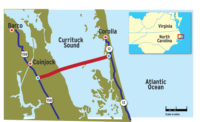Despite the financial crisis in southern European Union countries, the Portuguese government has launched construction of a $1.9-billion high-speed railroad to the Spanish border. But it has delayed bidding for a 13-km-long bridge that would carry the line north into Lisbon over the Tagus River.


Portugal’s first high-speed line will extend 165 km from Poceirão, some 34 km south of Lisbon, to Caia, halfway between Elvas, Portugal, and Badajoz, Spain. Due for completion in about four years, the line will carry trains running up to 350 km per hour, which will reduce travel time over the 640 km between the two nations’ capitals to 2.75 hours from 6.25 hours.
Under a 40-year public-private partnership, sealed in May, the consortium Elos–Ligações de Alta Velocidade S.A. will partially finance, design, build and maintain the new line. Elos is owned by seven Portuguese contractors, operators and financiers, plus firms from Spain and Brazil. The two largest investors are Lisbon-based operator Brisa-Auto-estradas de Portugal S.A., and the contractor is Soares da Costa S.G.P.S., Porto.
The state’s high-speed-rail procurement agency, Rede Ferroviária de Alta Velocidade S.A. (RAVE), launched the project for international bids two years ago, just before the banking crisis erupted. Three groups bid, and Elos won in December. Labeled a priority project within the E.U.’s Trans-European Transport Network, the project has attracted substantial subsidies and long-term loans.
Just over half the financing is coming from Portuguese and European agencies. Elos has raised the rest as equity from partners and bank debt. But the government balked at continuing procurement of the $2.5-billion PPP project, including the bridge, to take the line into Lisbon.
When RAVE launched the project, the government’s deficit was well under the E.U.’s formal limit of 3% of gross domestic product for states in the Euro zone, says Secretary of State for Transport Carlos Correia da Fonseca. But now the deficit is close to 10%, he says.
Correia da Fonseca forecasts that markets will stabilize enough by year’s end to restart the bridge’s procurement process. If so, the contract could be awarded next year. But other projects have fared less well in the government’s drive to cut the deficit to 2.8% of GDP by 2013; among them is a 417-km high-speed coastal line from Lisbon through Porto toward Vigo, in Spain. Its procurement has been shelved for two years.


